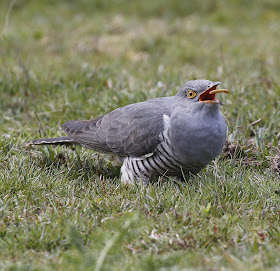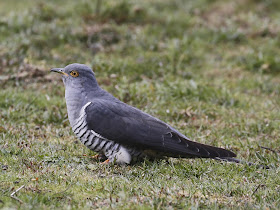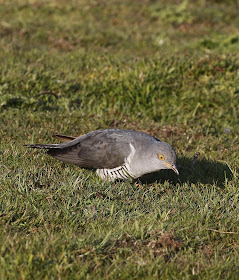In 1912 the English composer Frederick Delius wrote a lovely and beautiful piece of music called 'On hearing the first Cuckoo in Spring.' It is a gentle, reflective tone poem and although the tune is based on a Norwegian Folk song 'In Ola Valley' it sounds and to my mind is quintessentially English. Listening to it you can imagine a cuckoo in some deep leafy wood calling its unique 'cuckoo' and the listener musing over a life lived in less turbulent times.
I doubted whether there would be much chance of quiet reflection when I next visited Colin the Cuckoo who has returned for a fifth year to Thursley Common in Surrey, as his fame and popularity has now spread throughout the land and people come from far and wide to see and photograph him. Any visit to see Colin was bound to be in the company of many others, some of whom would not have the same sensitivities.
Bearing this in mind I was unsure if I really wanted to stand for a couple of hours listening to the infuriating blather from my fellow humans about camera settings, the light, birding holidays and regurgitating interminable lists of everything they had seen in minute and tedious detail. However the benefits just about outweighed the detriments so I resolved to head south to Thursley Common where this remarkable cuckoo, nicknamed Colin for I know not why, has returned, defying all the odds that he faces every year on his hazardous migration from Africa, to arrive unscathed in the very same tree surrounded field as in the years before. It is a remarkable story but must be the same for every cuckoo that returns to Britain and is yet another manifestation of the natural wonders of this planet we exist on but treat with such apparent disdain and are slowly destroying.
Colin the Cuckoo was first noticed to have arrived five days ago and already many photographers and birders with cameras have made the annual pilgrimage to see him. Some took it to ridiculous lengths and photographers have arrived dressed in full camo gear or with deck chairs and a range of artificial perches. Colin shows little concern about the large numbers of people, with sometimes up to forty clustered in the field, ranged around one particular corner of the field and viewing specially erected perches, liberally baited with meal worms and to which he comes at intervals and can be watched down to just a few metres
Today I arrived, by choice, later than is my usual time, in mid morning at around 11am, but this was fortuitous as many of the crowd had decided to depart once Colin had flown in a couple of hours earlier and consumed a prodigious amount of mealworms. I was told by those present that Colin had only visited on that one occasion so far this morning.
From my experience in previous years I knew that Colin would return when he again felt the need for more sustenance. I waited with about fifteen others but in the cuckoo's absence there was plenty other birdlife to entertain me in the meantime.
A pair of Wood Larks were strutting around on the grass and these were my first for the year. Such bland understated birds, dressed in buff and streaked brown feathers that perfectly blend with their habitat of sandy heathland, the birds made exceptional in possessing an enchanting song.
 |
| Woodlark |
A male Common Redstart was singing in the nearby trees and later availed itself of the plentiful supply of mealworms put out for the cuckoo, arriving at high speed from the trees on the opposite side of the field, and perching on the various logs, posts and other contrived perches put out for that ultimate cuckoo shot. Common Redstarts, well the males at least, are very beautiful birds, their rusty orange tail quivering for all its worth, a manifestation of the nervous energy that radiates from this species.
 |
| Common Redstart |
As if this was not enough a pair of European Stonechats were also taking advantage of an easy meal, flying in from a nearby patch of bracken and bramble to perch and then drop down to grab a mealworm.
 |
| Male European Stonechat |
 |
| Female European Stonechat |
The male, even at this early stage, had a large white rump and neck patches and I found myself wondering if this was more typical of the sub species rubicola that you find on the continent than our our bird hibernans which is a mite darker and shows less white on rump and neck, especially at this time of year. Who knows? Our artificial boundaries are not those recognised by nature.
A man in a wheelchair arrived, pushed by a colleague. He looked familiar and I realised it was Frank Gardner, the BBC's Security Correspondent and a keen birder. He was shot and paralysed in 2004 by terrorists in Riyadh, Saudi Arabia whilst reporting but has refused to allow this to deter him from his interest in birds. I could but admire the strength of will that got him to this field, as it could not have been an easy journey, the tracks across the common being mainly soft sandy soil.
On the following Monday Frank Gardner was interviewed by John Humphreys on BBC Radio Four's Today programme about his experience seeing Colin
On the following Monday Frank Gardner was interviewed by John Humphreys on BBC Radio Four's Today programme about his experience seeing Colin
 |
| Frank Gardner |
Time moved on and Colin arrived in the trees on the other side of the field and sat there perfectly content.
 |
| Looking across the field to the surrounding trees. Note the gate which is another artificial perch to entice Colin.Where it came from no one knows! |
Cuckoos normally spend a lot of their time just sitting quietly, hidden in trees and Colin was true to form. A short burst of half hearted 'cuckoos' kept us on our mettle but he soon subsided into silence. For around forty minutes he remained in his silver birch tree, a grey and white, ill defined image surrounded by yellow catkins and thin. lichen encrusted branches still to come into leaf.
Finally, silently and unheralded, he swooped down and came towards us on fast moving, flickering wings, to land on one of the artificial perches.
This was a signal for many of the assembled throng to depart and just half a dozen of us were left. It was obvious to me that Colin the cuckoo would now sit in his tree until he was hungry again and then the whole episode that had just passed would be repeated.
This turned out to be precisely what transpired as presumably there were no female cuckoos around this early in the year to be worried about and so Colin's priority was food and with a ready and endless supply of mealworms donated by the photographers he just sat in a tree nearby until hunger called once again.
The cuckoo visited four more times during the afternoon, sometimes perching in a silver birch just above us, slumping onto his perch in repose and then when hungry, turning to face us and eventually flying to the ground, where in the soft, late afternoon sunlight, he looked quite superb.
Towards the late afternoon when numbers were down to just four of us another photographer arrived clutching a branch each of gorse and flowering cherry. When we queried what on earth he was carrying all this flowering vegetation for, as if we did not know, we were told he planned to create an artificial shot of the cuckoo perched amongst the flowers. Another professional photographer who had been with us throughout the day and who worked for an international photo agency took exception to this and mildly rebuked him for being foolish and for a while it looked as if it was going to get a bit heated. I remained silent as these two photographers exchanged their divergent opinions but eventually it calmed down and on my suggestion a truce was formed whereby the photographer who had been here all day got one more go at photographing Colin on his 'normal' perches and then the new arrival could erect his floral perch and try his luck.
In fact the results of the floral perch, although totally artificial, were from my point of view quite a nice touch, albeit totally contrived, and made a change from all the images I had taken earlier and, even better, everyone was now happy and a slightly ridiculous and mildly unsettling contretemps was all forgotten and with that I departed for home.

































Great write up as usual but I think you’ve finally convinced me, if I needed to be, that it just isn’t for me!
ReplyDeleteLove the ones with the blossom!
ReplyDeleteMe too!
Delete